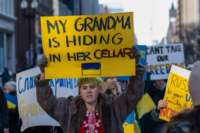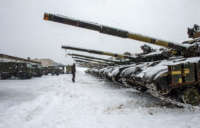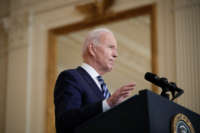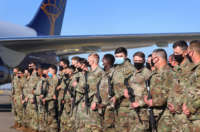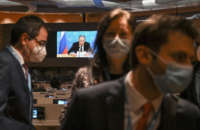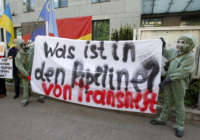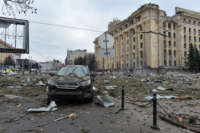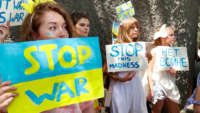
Russia has escalated attacks against Ukraine, launching a missile strike hitting a government building and shelling civilian areas in Kharkiv, reportedly targeting civilians with cluster and thermobaric bombs, and killing more than 70 Ukrainian soldiers at a military base in Okhtyrka. Meanwhile, the U.S. rejected Ukrainian President Zelensky’s demand for a no-fly zone over Ukraine, saying it could lead to a war between the U.S. and Russia. This comes as Ukrainian and Russian negotiators failed to reach an agreement on Monday and the European Union approved Ukraine’s emergency application to be a candidate to join the union. We go to Kyiv to speak with Yurii Sheliazhenko, executive secretary of the Ukrainian Pacifist Movement, who says “support of Ukraine in the West is mainly military support” and reports that his country “focuses on warfare and almost ignores nonviolent resistance to war.” He also discusses Zelensky’s response to the crisis, the European Union’s approval of Ukraine’s emergency application, and whether he plans to leave the war-torn city of Kyiv soon.
TRANSCRIPT
This is a rush transcript. Copy may not be in its final form.
AMY GOODMAN: The Russian invasion of Ukraine has entered its sixth day, with Russia escalating its bombardment. Satellite images show up to a 40-mile convoy of Russian armored vehicles, tanks and artillery heading to Kyiv, the capital of Ukraine. Earlier today, a Russian missile hit a government building in Kharkiv, causing a huge explosion in Ukraine’s second-largest city. Civilian areas in Kharkiv have also been shelled. Ukrainian authorities also reported more than 70 Ukrainian soldiers have been killed in the eastern city of Okhtyrka after a Russian missile strike on a military base.
On Monday, Ukraine and Russia held five hours of talks near the Belarus border, but no agreement was reached. The two sides are expected to meet again in the coming days. Ukrainian President Volodymyr Zelensky has called for a no-fly zone over Ukraine, but the United States and its allies have ruled out the idea, saying it could lead to a broader war.
Ukraine and human rights groups have also accused Russia of targeting civilians with cluster and thermobaric bombs. Those so-called vacuum bombs are the most powerful non-nuclear explosives used in warfare. Russia has denied targeting civilians or civilian infrastructure. Meanwhile, the International Criminal Court has announced plans to investigate war crimes in Ukraine.
At the United Nations, the General Assembly held an emergency meeting Monday to discuss the crisis. This is Ukraine’s Ambassador Sergiy Kyslytsya.
SERGIY KYSLYTSYA: If Ukraine does not survive, international peace will not survive. If Ukraine does not survive, the United Nations will not survive. Have no illusions. If Ukraine does not survive, we cannot be surprised if democracy fails next. Now we can save Ukraine, save the United Nations, save democracy and defend the values we believe in.
AMY GOODMAN: And just before we went to broadcast, the Ukrainian President Volodymyr Zelensky addressed the European Parliament by video. At the end, the Parliament gave him a standing ovation.
We go now to Kyiv, where we’re joined by Yurii Sheliazhenko. He is the executive secretary of the Ukrainian Pacifist Movement and a board member of the European Bureau of Conscientious Objection. Yurii is also a member of the board of directors at World BEYOND War and a research associate at KROK University in Kyiv.
Yurii Sheliazhenko, welcome back to Democracy Now! We spoke to you just before the Russian invasion. Can you talk about what’s happening on the ground right now and what you are calling for as a pacifist?
YURII SHELIAZHENKO: Good day. Thank you for balanced journalism and covering peace protest as part of pains and passions of war.
Military politicization between the East and West went too far, with reckless military operations, NATO expansion, Russian invasion to Ukraine and nuclear threats to world, militarization of Ukraine, with exclusion of Russia from international institutions and expulsions of Russian diplomats literally pushing Putin from diplomacy to escalation of war. Instead of breaking the last bonds of humanity out of rage, we need more than ever to preserve and strengthen venues of communication and cooperation between all people on Earth, and each individual effort of that sort has a value.
And it is disappointing that support of Ukraine in the West is mainly military support and the imposition of painful economic sanctions on Russia, and reporting on conflict focuses on warfare and almost ignores nonviolent resistance to war, because brave Ukrainian civilians are changing street signs and blocking streets and blocking tanks, just staying in their way without weapons, like tank men, to stop the war. For example, in Berdyansk city and Kulykіvka village, people organized peace rallies and convinced the Russian military to get out. Peace movement warned for years that reckless militarization will lead to war. We were right. We prepared many people for peaceful dispute resolution or for nonviolent resistance to aggression. We upheld human rights, universal obligations to help refugees. It helps now and gives hope for a peaceful solution, which exists always.
I wish to all people for universal peace and happiness, no wars today and forever. But, unfortunately, while the most of people, most of time, in most of places, live in peace, my beautiful city of Kyiv, capital of Ukraine, and other Ukrainian cities are targets of Russian bombardments. Just before this interview, I heard again distant sounds of explosions from windows. Sirens howl many times during day, last several days. Hundreds of peoples are killed, including children, because of Russian aggression. Thousands are injured. Hundred thousands of people are displaced and seeking refuge abroad, additionally to millions internally displaced persons and refugees in Russia and in Europe after eight years of war between the Ukrainian government and Russia-backed separatists in Donbas.
All males in the age from 18 to 60 are restricted in freedom of movement abroad and called to participate in war effort, without exceptions to conscientious objectors to military service and those who are fleeing from war, too. War Resisters’ International strongly criticized this decision of Ukrainian government to prohibit all male citizens in age 18 to 60 to leave the country and demanded a withdrawal of these decisions.
I admire massive antiwar rallies in Russia, courageous peaceful citizens who nonviolently oppose Putin’s war machine under threats of arrest and punishment. Our friends, conscientious objection movement in Russia, also members of European Bureau for Conscientious Objection, condemns the Russian military aggression and calls on Russia to stop the war, calls all recruits to refuse military service and apply for alternative civilian service or claim exemption on medical grounds.
And there are peace rallies around the world in support of peace in Ukraine. Half-million of people in Berlin hazard to protest against war. There are antiwar actions in Italy, in France. Our friends from Gensuikyo, the Japan Council Against Atomic and Hydrogen Bombs, responded to Putin nuclear threats with protest rallies in Hiroshima and Nagasaki. I invite you to seek for recent international and United States antiwar events at the website WorldBeyondWar.org, to participate in the global day of action to stop the war in Ukraine on March 6 under a slogan, “Russian troops out. No NATO expansion,” organized by CodePink and other peace groups.
It is a shame that Russia and Ukraine up to now fail to negotiate ceasefire and failed even to agree on safe humanitarian corridors for evacuation of civilians. Negotiations between the Ukraine and Russia didn’t achieve a ceasefire. Putin needs neutral status of Ukraine, denazification, demilitarization of Ukraine and the approval that Crimea belongs to Russia, which is contrary to international law. And he told it to Macron. So, we renounce these demands of Putin. Ukrainian delegation on negotiations was ready to discuss only ceasefire and Russian troops leaving Ukraine, because, of course, territorial integrity matters of Ukraine. Also, Ukraine continued shelling of Donetsk while Russia bombarded Kharkiv and other cities. Basically, both parties, Ukraine and Russia, are belligerent and not willing to calm down. Putin and Zelensky should engage in peace talks seriously and in good faith as responsible politicians and representatives of the people, on the basis of common public interest, instead of fighting for mutually exclusive positions. I hope that there is a —
JUAN GONZÁLEZ: Well, Yurii, Yurii Sheliazhenko, I wanted to ask you — you mentioned President Zelensky. He’s being hailed in many of the Western media as a hero since the invasion. What is your assessment of how President Zelensky has been functioning in this crisis?
YURII SHELIAZHENKO: President Zelensky is totally surrendered to war machine. He pursues military solution, and he fails to call Putin and ask directly to stop the war.
And I hope that with the help of all people in the world telling the truth to power, demanding to stop shooting and start talking, aiding those who need it and investing into the peace culture and education for nonviolent citizenship, we could together build a better world without armies and borders, a world where truth and love are great powers, embracing East and West. I believe that nonviolence is a more effective and progressive tool for global governance, social and environmental justice.
The delusions about systemic violence and war as panacea, a miraculous solution for all social problems, are false. The sanctions with which the West and the East are imposing on each other as a result of a battle for control over Ukraine between the United States and Russia may weaken but will not split the global market of ideas, labor, goods and finances. So, the global market will inevitably find a way to satisfy its need in global government. Question is: How civilized and how democratic will be the future global government?
And military alliances’ aim to uphold absolute sovereignty are promoting despotism rather than democracy. When NATO members provide military aid to support sovereignty of Ukrainian government, or when Russia sends troops to fight for self-proclaimed sovereignty of Donetsk and Luhansk separatists, you should remember that unchecked sovereignty means bloodshed, and sovereignty is — sovereignty is definitely not democratic value. All democracies emerged from resistance to bloodthirsty sovereigns, individual and collective. War profiteers of the West are the same threat to democracy as the authoritarian rulers of the East. And their attempts to divide and rule the Earth are essentially similar. NATO should step back from conflict around Ukraine, escalated by its support to war effort and aspirations of membership of Ukrainian government. And ideally, NATO should dissolve or transform into alliance of disarmament instead of military alliance. And, of course —
AMY GOODMAN: Let me ask you something, Yurii. We just got this word in. You know, Zelensky has just addressed by video the European Parliament. They gave him a standing ovation after, and the European Parliament has just approved Ukraine’s application to join the European Union. What is your response to that?
YURII SHELIAZHENKO: I feel proud for my country that we are joined to alliance of Western democracies, European Union, which is a peaceful union. And I hope that all the world in the future will be peaceful union. But, unfortunately, European Union, as well as Ukraine, have a similar problem of militarization. And it looks like a dystopian Ministry of Peace in Orwell’s novel 1984, when European peace facility provides military assistance to Ukraine, but there is almost absent assistance to nonviolent solution to current crisis and to demilitarization. I hope, of course, Ukraine belongs to Europe. Ukraine is a democratic country. And it is great that the Ukrainian application to join European Union is approved, but I think that this consolidation of West should not be consolidation against so-called enemy, against the East. East and West should find the peaceful reconciliation and should pursue global governance, unity of all people in the world without armies and borders. This consolidation of West should not lead to a war against East. East and West should be friends and live peacefully and demilitarized. And, of course, the Treaty on the Prohibition of Nuclear Weapons is one of venues of total demilitarization which are needed desperately.
You know, now we have a problem of archaic governance based on sovereignty of nation-states. When, for example — when Ukraine prohibits many citizens to participate in public life speaking Russian, it seems like normal. It seems like sovereignty. It is not, of course. It is not a just cause for invasion and military aggression, of course, as Putin claims, but it is not right. And, of course, the West many time should say to Ukraine that human rights is a very important value, and freedom of expression, including linguistic rights, matter, and the representation of pro-Russian people, Russian-speaking people in political life is important thing. And the oppression of culture of our neighbor and their diaspora in Ukraine, of course, will infuriate Kremlin. And it infuriated. And indeed this crisis should be deescalated, not escalated. And this indeed great day when Ukraine was recognized a European nation should not be the prelude for opposition, military opposition, between Europe and Russia. But I hope that Russia, too, will head out with their military forces from Ukraine and will also join European Union, and European Union and the Shanghai Cooperation Organization and other regional alliances, African Union and so on, in future will be parts of a united global political entity, global governance, as Immanuel Kant in his beautiful pamphlet, Perpetual Peace, envisaged, you know? A plan of Immanuel Kant for —
JUAN GONZÁLEZ: Well, Yurii, Yurii Sheliazhenko, I wanted to ask you — in terms of the issue of deescalating the situation and seeking to achieve peace, Ukraine has requested a no-fly zone over certain areas of Ukraine. That would obviously have to be enforced by the militaries of the European Union and the United States. What do you feel about this issue of a call for a no-fly zone over Ukraine?
YURII SHELIAZHENKO: Well, it is continuation of this line to escalation, to engage whole West, united in military aspect, to oppose Russia. And Putin already responded to this with nuclear threats, because he is infuriated because he is, of course, scared, as well as we are scared today in Kyiv, and the West are scared about the situation.
Now we should stay calm. We should think rationally. We should unite indeed, but not unite to escalate conflict and give military response. We should unite pursuing peaceful solution of conflict, negotiations between Putin and Zelensky, presidents of Russia and Ukraine, between Biden and Putin, between the United States and Russia. Peace talks and things about future are the key, because people start war when they lose hopes in future. And today we need revived hopes in future. We have a peace culture, which are starting to develop throughout the world. And we have old, archaic culture of violence, structural violence, cultural violence. And, of course, the most of people are not trying to be angels or demons; they are drifting between culture of peace and culture of violence.
AMY GOODMAN: Yurii, before we go, we just wanted to ask you, since you are in Kyiv, the military convoy is just outside of Kyiv: Are you planning to leave, like so many Ukrainians have tried to leave and have left, something like estimates of half a million Ukrainians over the borders into Poland, Romania and other places? Or are you staying put?
YURII SHELIAZHENKO: As I said, there is no safe humanitarian corridors agreed by Russia and the Ukraine for leaving civilians. It is one of failures in the negotiations. And as I said, our government thinks that all males should participate in war efforts, and blatantly violates human right to conscientious objection to military service. So, it is no way for pacifists to flee, and I stay with peaceful Ukraine here, and I hope that peaceful Ukraine will not be destroyed by this polarized, militarized world.
AMY GOODMAN: Yurii Sheliazhenko, we want to thank you so much for being with us. Yes, males between the ages of 18 and 60 are not allowed to leave Ukraine. Yurii is the executive secretary of the Ukrainian Pacifist Movement, board member of the European Bureau for Conscientious Objection, also member of the board of directors at World BEYOND War and research associate at KROK University in Kyiv, Ukraine.
Coming up, we look at the roots of the crisis in Ukraine. We’ll be joined by Andrew Cockburn of Harper’s magazine and Yale University professor Timothy Snyder. Stay with us.
[break]
AMY GOODMAN: “Try to Remember,” Harry Belafonte. He turns 95 years old today. Happy Birthday, Harry! If you want to see our interviews over the years with Harry Belafonte, you can go to democracynow.org.
This post was originally published on Latest – Truthout.

